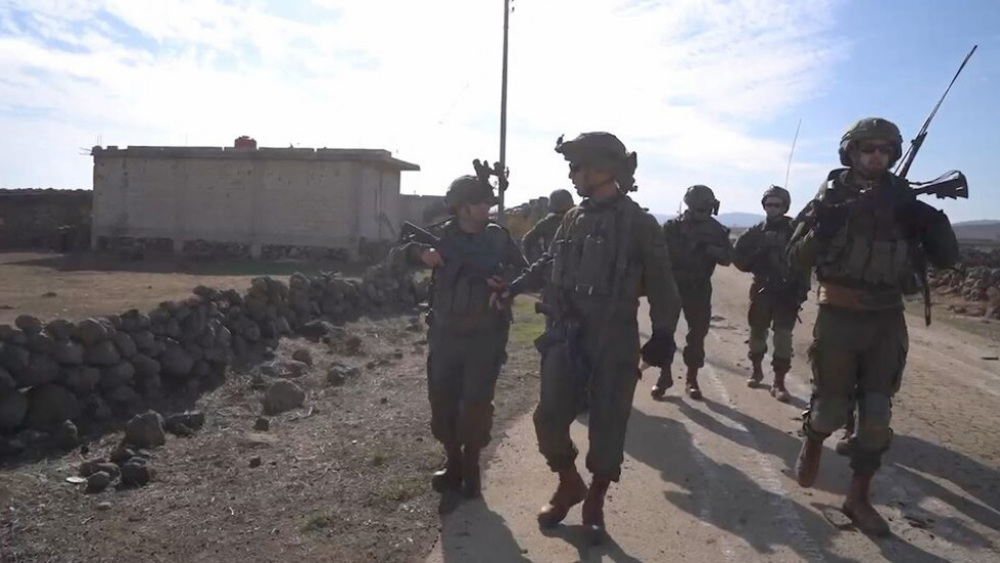Israel’s new deterrence capacity strategy- Stealing land, bombing Syria and alliances with Arab regimes
By Robert Inlakesh
Robert Inlakesh is a journalist, writer and political analyst, who has lived in and reported from the occupied Palestinian West Bank. He has written for publications such as Mint Press, Mondoweiss, MEMO, and various other outlets. He specializes in analysis of the Middle East, in particular Palestine-Israel. He also works for Press TV as a European correspondent.
Israeli Prime Minister Benjamin Netanyahu is proposing the annexation of the Jordan Valley and Illegal Israeli settlement areas into Israel, starting from the 1st of July, stressing that the opportunity must be seized to commit such an action. But what does this annexation plan say about Israel’s strength in the region and its infamous “deterrence capacity”?
Since the arrival of Donald Trump to office, in the United States, Israel has been granted US recognition of Jerusalem (al-Quds) as being its capital, US recognition of Israeli sovereignty over the illegally annexed Golan Heights as well as being granted free reign to massacre unarmed Palestinians demonstrators in the besieged Gaza Strip. Now the US has presented its so-called Deal of the Century, giving Israel the green light to annex roughly half of the occupied West Bank.
But, despite the situation looking bleak for the Palestinians and the wider region, Israel has in fact been significantly weakened by the steadfastness of Middle East resistance. Beginning in 1967 Israel set forth a goal for itself, in order to maintain dominance over the Arabs and Muslims, this was done through the usage of excessive displays of military power. Israel has since coined the term for this power, as their “deterrence capacity” or as former Israeli Prime Minister Ariel Sharon once put it “the Arabs’ fear of us”.
It is safe to say that this fear did previously exist in the region, especially due to the military power of the United States backing Israel at every turn. However in the year 2000, this fear once felt throughout the region, was beginning to fade, as the Lebanese resistance forced Israel along with its “South Lebanon Army” out of the country. Then, in 2005 Israel was forced by Palestinian resistance in the Gaza Strip, to withdraw its forces and illegal settlers.
Israel was bitter and so found its pretext in 2006 to launch its planned recapturing of the Arabs' fear of it, by engaging in a war against Lebanon. However the Lebanese resistance once again forced Israel into retreat. Israel had suffered a serious blow and was now frightened to tangle once again with the Lebanese resistance group Hezbollah, so it sought to focus its sights elsewhere. The US invasion and overthrowal of Saddam Hussein in 2003 had asserted the US’s power in the Middle East, so Israel looked to live up to the destruction caused by its ally. It decided upon the Gaza Strip as its target and so began a number of bombardments of Gaza. The most notable of which have since been the 2008/9, 2012 and 2014 wars in which thousands of civilians were massacred in Gaza.
However, despite the massive destruction carried out against Gaza, Israel failed to eliminate the Palestinian resistance, suffering heavy casualties, amongst its soldiers, virtually every time they engaged in on-the-ground fire-fights with the resistance. This was especially shown to be the case in 2014 where approximately 67 Israeli soldiers were killed and hundreds wounded by the Palestinian resistance.
Israel has since 2014 attempted to assert its dominance in several ways, yet has largely failed to achieve its objective or properly restore its deterrence capacity. Israel is still afraid to attack Lebanon, Israel didn’t manage to seize anymore land from Syria and has failed to defeat Hamas and Islamic Jihad in the Gaza Strip.
In fact in November of 2018, Israel was utterly embarrassed in front of the entire region, as a botched raid into Gaza by Israeli special forces was thwarted and Israel was attacked with a range of new weapons from Gaza, killing several Israeli soldiers. The situation ultimately resulted in the then Minister of War, Avigdor Lieberman, to resign in disgrace, attempting to blame Benjamin Netanyahu’s cowardice to start a war.
Of course Lieberman was attempting to save his own political life, but he was also right about Benjamin Netanyahu’s hesitancy to launch a large-scale military operation against Hamas and Islamic Jihad.
Since this time, Israel has not been so eager to bombard the Gaza Strip as regularly as it once did. So, Israel has begun to focus its efforts, almost solely, on asserting its dominance in different ways.
Israel current strategy to assert regional dominance
The Israelis have continued their airstrike campaigns inside Syrian sovereign territory, attempting to assert their dominance inside of the country and to counter Syria’s ally Iran. However, Israel has been unsuccessful on this front and has not inflicted any major strategic blow to Iran in Syria. The Israeli military also claims to have dealt significant blows to the Lebanese Resistance group Hezbollah and its cross border weapons transfers, yet in reality it has achieved virtually nothing. Yet despite not actually achieving anything, the Israeli government can appear to be looking strong against Hezbollah, Syria and Iran.
When Donald Trump scrapped the JCPOA nuclear agreement with Iran, Israeli PM Benjamin Netanyahu was one of the most vocal supporters of the US move to withdraw from the agreements and wage economic war upon Iran. With the US applying such pressure on Iran, Israel’s propaganda machine worked around the clock, attempting to paint Iran as posing an immediate threat to Israel, as Netanyahu constantly warned about Iran being in pursuit of, non-existing, plans to build nuclear weapons.
Israel has also engaged in several operations against the Palestinian Islamic Jihad resistance movement in both Syria and Gaza, via airstrikes, targeting the groups leadership. In November of 2019, Israel launched airstrikes which killed Baha Abu Atta, a top ranking Islamic Jihad Commander, along with several family members including his wife, in his family home. The Israeli illegal murder of Abu Atta was a weak attempt to show strength against the Palestinian resistance, yet even during the battle which ensued between Islamic Jihad and Israel following Israel’s murder of Baha Abu Atta, Israel dared not touch a single Hamas position in Gaza for fear of the consequences of such an action.
At this time, Israel’s so called deterrence capacity is virtually non-existent as the Israelis have essentially got to step on eggshells when it comes to military operations in Gaza and Lebanon, they also have to take great caution as to not fully ignite a war with Syria.
So instead of igniting a full scale war of any sort, it is very possible that Israel seeks to engage in smaller scale conflict with Syria, with the intention of getting an effective buffer zone set up along the occupied Syrian Golan Heights.
Israel is also using the strategy of attempting to use Arab collaborator regimes, such as Saudi Arabia, to form relationships which will result in the pacifying of resistance in the region through economic means.
On top of this Israel is seeking to finish the job it started in 1967, when it occupied the West Bank and Gaza Strip, by annexing essentially half of the West Bank and asserting its dominance. Israel understands that to annex this land in the West Bank, is perhaps it's easiest option politically and physically to take and so its next offensive will be different in nature and will look to make a point to a wider region. Israel especially agitates Muslims and Arabs in the region and around the world, with its annexation plan, because this entails within it the de facto stealing away of the Al-Aqsa compound in Jerusalem (Al-Quds), the third holiest site to Muslims and most significant site in Palestine.
Ultimately, Israel may appear to show signs of strength, as it has a overtly pro-Israeli right wing extremist President when it comes to supporting Israeli actions in the Middle East. However, the United States has had this very special relationship with Israel since the rise of President Lyndon B. Johnson and it has only ever grown from that point on, especially following the 1967 war. Now it is just obvious for the world to see that the full might of the US is thrown behind Israel. However, the resistance both in Palestine and in the wider region has prevailed and continues to win out small victories against the US backed Israeli regime.
(The views expressed in this article do not necessarily reflect those of Press TV.)
Iran Armed Forces pledge firm response to any hostile act
General Soleimani was 'architect of Axis of Resistance’ in region: Iran FM
VIDEO | Somalis protest against Israel's recognition of Somaliland
UN rapporteur says Georgetown cut ties over exposing Israel’s genocide in Gaza
VIDEO | Press TV's news headlines
West-funded body conspired against EU anti-fraud office after corruption findings: Report
Iran heralds clean energy future with landmark geothermal power plant at Mount Sabalan
Iran warns Israel’s recognition of Somaliland aims at destabilizing entire region












 This makes it easy to access the Press TV website
This makes it easy to access the Press TV website